
David J. Phillip/AP
- Fannie Mae revised its 2021 housing forecast to account for the housing shortage.
- It now sees housing starts increasing 24.8% in 2021 in response to declines in existing home sales.
- But the forecast doesn't include a nearly 10% drop in housing starts for April, and supply constraints remain.
- See more stories on Insider's business page.
With a surge of people seeking to buy homes during the pandemic, demand is increasingly outpacing supply, transforming 2020's housing boom into 2021's housing shortage.
Following a 3.7% decline in existing home sales at the end of March and a 13.4% drop in April, Fannie Mae sounded the alarm in its monthly economic and housing outlook, and upgraded its forecast of housing starts, or construction of new homes. But it may not be enough.
The housing firm's Economic and Strategic Group revised its view of single-family housing starts to an increase of 24.8% in 2021 compared to 2020 – a modest increase from the previous month and one that doesn't take into account housing starts falling 9.5% in April.
"We have long expected that a combination of waning COVID-19-induced movement into single-family housing and continued tight inventories would lead to a slowing pace of existing home sales as the year progresses," the report said. "However, the latter factor appears increasingly more limiting."
The report added that housing starts would have been greater if not for supply constraints caused by lumber shortages and other materials, as well as a lack of buildable plots, a statement seemingly confirmed by April's surprise drop in starts. Insider's Ben Winck reported on Thursday that fixing the housing shortage is proving too expensive right now for homebuilders.
The National Association of Home Builders found in May that high lumber prices have added $35,872 to the average price of a new home, and housing platform Zonda reported that builders have intentionally slowed construction because they don't have enough building materials to keep up with demand.
Insider reported on Wednesday that the housing shortage could last for years, citing Goldman Sachs projections that millennial homebuying should continue while starts will increase to the insufficient level of 1.5 million per year, and foreclosures won't meaningfully impact supply. In other words, house prices should continue to go up for years.
So even though Fannie Mae revised housing starts upward, Goldman's Ronnie Walker wrote that as demand for housing remains high, little is being done - and can be done - to fix the low housing supply. "The resulting picture is one of a persistent supply-demand imbalance in the years ahead."
